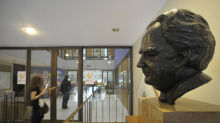
Frye’s bust in Northrop Frye Hall, Victoria College, University of Toronto. His interview with Ramsay Cook, referenced below, can be found here.
*
The last six words of my heading are, in fact, the title of an essay (CW 7: 465-69) by Frye about the “bureaucratic cant” that floods any discussion of the role of the university in society, at least from the news media and, even more significantly, within educational bureaucracies themselves, which have internalized the prejudices of larger society outside the colleges and universities.
Bob Denham’s essay “Common Cause” (in his new book published here in our library) draws out the core assumptions of Frye’s understanding of the links identifying criticism, art and literature, and education. The threat to university education has continued to grow over the last four decades. Like any other university, and like the Soviet Union under Stalin, the institution to which I belong, McMaster University, has been regularly subjected to presidential five-year year plans, and now, once again, we have been presented with a new vision from our president, now in the second year of his term. Vision, however, is not the word for what is essentially, to use Frye’s phrase, a deluge of cant, a torrent of clichés and platitudes about the new directions university education must take if we are to keep up with the Joneses and not end up in the dust-bin of history, as if such logic were not the surest guarantee of the oblivion we should be trying to avoid. Predictably, we hear the same old mantras about the necessity of change and the need for “relevance.” In the current political climate, this means that change must go in the direction of digital technology and the immediate utilitarian needs of the economic system and social policies as set by provincial and federal governments. At the federal level, the Social Sciences and Humanities Research Council has already introduced changes tying doctoral and research grants to the perceived immediate needs of society. In an unprecedented way, justification for funding must fall in line with what governments have decided is most useful for society at this particular moment in time; never before in this country has university education been asked to mirror so closely society as it presently exists outside it.
The concept of “relevance” and the meaningfulness of a university education first arose in the late sixties at the time of student unrest on campuses across North America; it was part of protest movements that questioned the absurdity and evil of a society implicated in the horrors of the Vietnam war. Frye was sympathetic to the reasons for the unrest, to the desire of young people at universities to participate fully in society and transform existing arrangements in ways that would bring it closer to a world that makes human sense. But he also believed that the only thing that has had any power to change the world in a positive direction are the arts and sciences. He makes the very illuminating distinction between society as it exists and the genuine and permanent society that remains, even as the ephemeral society of history keeps disappearing. The only enduring society is the one we build up from the study of the physical universe and the study of the imaginative or virtual one that presents us with a vision of the world as it might be if we had the will to change it.
Since the sixties, the idea of relevance urged by a sense of absurdity and alienation has largely shifted to a much more utilitarian one. The exception perhaps has been in the teaching of literature and related humanistic disciplines where the old New Left still holds sway. Frye observes more than once that relevance as an educational concept on a large scale was invented by the Nazis. In his Northrop Frye in Conversation, a transcription of a series of interviews with David Cayley aired on the CBC in 1989, the word appears in print as Fachwissenschaft. My German is wildly imperfect, but from what I can tell this word simply means subject of knowledge. There may have been an error in transcribing the German word as it was filtered through the goose-honk of Frye’s Maritime accent. The word Frye uses is, I believe, Zweckwissenschaft, or target-knowledge. The Nazis threw all their scientific resources into military and related technology as they prepared for war, but they also, of course, on the cultural front, overhauled humanistic teaching in a ruthless way to make it consistent with their racist theories and propaganda. Everything else was purged. The spectre of such a totalitarian control of education always haunts us, even in a democracy; or, more precisely, it haunts us because fascism, as Frye observed, is a disease of democracy. Among the students of the New Left who came of age in the sixties are many who swallowed their apparent disgust with the irrelevance of the universities and ended up teaching in the humanities. As they took over departments they became instrumental in creating a sea-change of “relevance” in the teaching of literature and the arts. They are now the champions of post-structuralism, New Historicism, cultural studies, and the proliferating sub-disciplines of these essentially ideological forms of criticism. They have overhauled the curriculum so that it now conforms to the issue-oriented dictates of political correctness. They see themselves, to use Frye’s apt phrase, as turning the wheel of history. But the problem, as Frye knew, is that that particular wheel turns on its own, so that what appears to be the permanent form of reality very quickly proves to be another illusion. In the meantime, however, what becomes of the permanent form of society–the world of the arts and sciences–when we pursue a will-of-the wisp and destroy the structures of the university that provide it with a home?